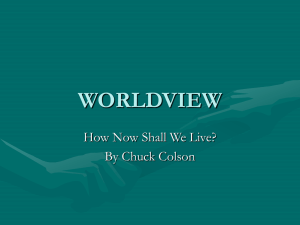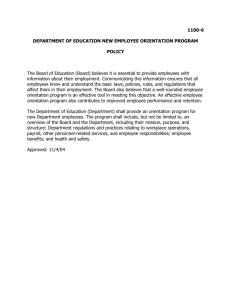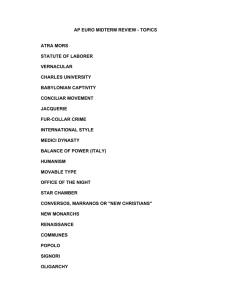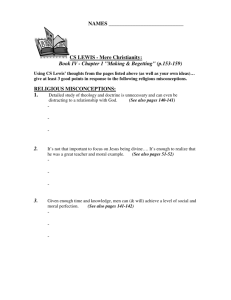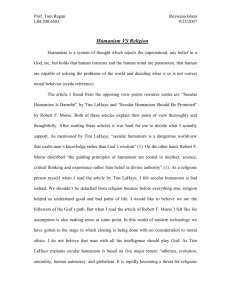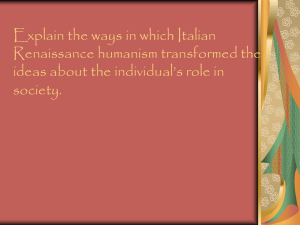Constructing a live Philosophy_Sarahvel - Sarah V
advertisement
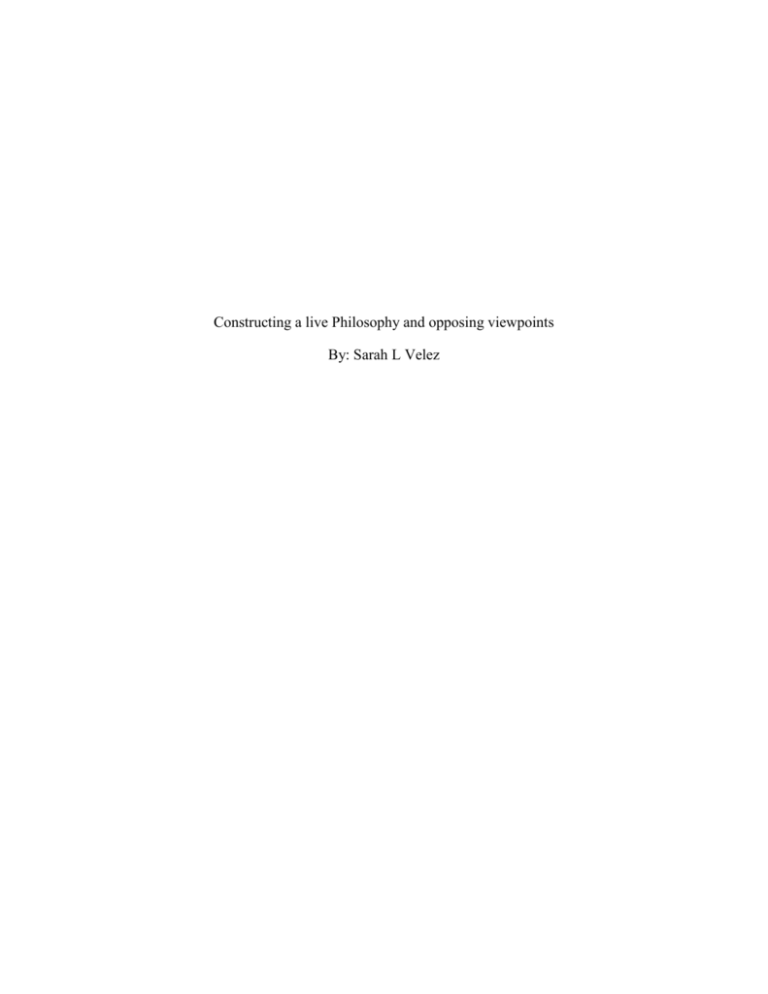
Constructing a live Philosophy and opposing viewpoints By: Sarah L Velez The importance of choosing a Life philosophy In this chapter, it went over 3 different viewpoints for exploration in differences of opinions and beliefs. And throughout the book, there are several different viewpoints and belief systems. I will briefly go over all viewpoints within each chapter of the book. The first chapter and viewpoint discussed our choosing a map for life, if we are living in a ‘cave’ and discovering our personal myths. These 3 particular viewpoints are pretty universal and can be applied most and their different opinions. M. Scott Peck, Author of, The Road Less Traveled, asked the readers to challenges themselves and really examines how they view the world and view themselves. If people do not honestly face the world and themselves with pure honesty, their lives will be limited and dishonesty with your self does nothing but great harm. Truth is reality. What unreal is false and can build or develop false hope. The clearer we see our lives and the World around us, the more honest we are with ourselves and with our lives. Viewing our reality is like a map. It helps negotiate our way around in life and will generate a sense of where we are. The more accurate the map, the more we will know where we are and how to get there. If our map is inaccurate or false, we will get lost. People may ignore the route in the map because it is difficult or hard to get there. That route is their reality and it’s not easy to get there. While ignoring this route, they tend to get lost and lose their reality. We are not born with a life map. We have to create our own life map. The more honest we are with reality, the broader and clearer our map is. One of the problems with making our map of life is revising our map as we go through our lives. In order for our maps to be more accurate, we must always revise them. Our directions in life changes often and we are always learning new things. Things also come and go. We must always face that reality and revise our map. Often we are introduced to new ideas or beliefs that don’t go hand in hand with our map. It gives us a sense of threat and we refuse to change our maps. Therefore, we present the other idea as false instead of being honest with ourselves and maybe starting from scratch with our life maps. The effort and change is frightening to them. We may actually crusade against it or spend hours trying to prove the new idea is wrong. People will cling onto their outmoded view and can bring on degrees of transference. Truth or reality is ignored when it is painful. This not being honest with ourselves and the world can harm us and it has harmful consequences. We are not open and honest with ourselves and the world and we don’t grow as individuals. It’s key to be open to challenges, accept new ideas, be real with ourselves and honest with the world, so that we can be happy, accepting and grow throughout our lives. Plato used the story of the prisoners who wouldn’t leave their caves and face the real world but base life off shadows casted upon a wall and wouldn’t turn their heads but focus of the casted shadows of objects. He used this to tell people that we are trapped by imperfect and subjective impressions of the World. We too quickly accept our first appearance of reality and create a distorted one. We don’t face true reality. We must leave the cave and have a final conclusion. Same Keene and Ann Valley-Fox explain that all humans need a “story line”, or a Myth, which puts life in a meaningful whole. Some people and journalists have used the term ‘Myth’ as to be a, “lie”, “fabrication”, “illusion”, “mistake” or similar. Supposedly, it’s opposite of a “fact” or what is “reality”. Such trivialization of the notion of myths reflects false certainties and dogmatic minds. In a strict sense, Myth refers to “an intricate set of interlocking stories, rituals, rites, and customs that inform and give pivotal sense of meaning and direction to a person, family, community and culture”. A living myth is like an iceberg; only 10 percent is visible and 90 percent is beneath the surface of consciousness. A Myth involves a conscious celebration of certain values but includes an unspoken consensus, a habitual way of seeing things, unquestioned assumptions and an automatic stance. At least 51 percent of the people in society are not aware of the myth that informs their existence. Myths can both be creative or destructive. Each individual has their own myth and Families also have myths, a lot like their own miniculture. What gives life ultimate meaning? Richard Robinson says that “Life has no purpose- we create it”. This viewpoint comes from his book, An Atheist’s Values, believes that the atheist’s views of Life requires a lot more strength and commitment than a theist’s view of life. He says that by denying God, has given him to take on more responsibilities in life, not less. We as Humans are insecure due to ignorance and there is no secret to the Universe. There is a vast amount we do not know and some is relevant to our survival and happiness. There is no one secret to the Universe but there is a lot we still need to learn. The main cause of our insecurities is the limitations of our power. What happens to us depends on forces we cannot always control and throughout our life, our power may greatly increase. With this, there is no God to make up the limitations of our power and nothing to save us from forces beyond our control. We are in control of our own selves and that will give us absolute security. Atheists believe our situation is far sterner than the theists approach, so our attitude with this approach, is a far nobler than a theist, who believes we were put here by an all power being and we have a purpose here. Robinson believes the reason why an atheist’s approach is sterner and nobler because we are in of ourselves, dignity, destiny, truth and virtue. That the Human Race is alone, we are alone in the Universe, therefore, we must all act brotherly toward each other and respect what is. This viewpoint was taken from an autobiography, Born Again, by Charles W. Colson. He talks about a special conversation he had with Tom Phillips and what made it so special. Charles always felt like there was something missing in his life. Even amongst all of his successes in life, there was a black empty hole that needed to be filled but he didn’t know what to fill it with. He experienced feelings he’s never experienced before and felt a rush of emotions he didn’t feel even existed. Tom’s conversation with him was very eye opening and it touched him deeply. More than he’s ever been touched. It all started to make sense to him on accepting Jesus Christ into your life. It was an overpowering and indescribable feeling and at times he felt Jesus Christ was standing right next to him opening his arms. Charles first felt he needed to really do some soul searching himself because he had some “intellectual hang-ups”. This experience was all so new to him and what he knew before, didn’t make sense. He felt he needed to figure it out all on his own so it would make better sense to him. He felt so exposed and unprotected after hearing the words “For pride is spiritual cancer: It eats up every possibility of love, or contentment, or even common sense.” His self-centered past washed over him life ‘waves’ and it was very painful for him. He felt so blinded by the truth and he really realized that the truth does hurt but truly awakening! He, at the end, humbly prayed to God and said, “Take me!” Riane Eisler, author of, The Chalice and The Blade, and co-founder of the Center for Partnership Studies, reinterprets ancient history and modern archeological findings to support what is called Ecofeminism. It is a philosophy in which people live in sexual and social equality in harmony with Nature. To her, the Gaia hypothesis is in essence a scientific update of the belief-system of Goddessworshipping, prehistoric societies. In these societies, they view the world was viewed as the great mother, a living entity who in both her temporal and spiritual manifestations creates and nurtures all forms of life. A dominator society worldview is ruled patriarchal or matriarchaly. Alternatively she found the partnership society: a way of organizing human relations in which beginning with the fundamental differences of our species-female and male and diversity is not equated by inferiority and superiority. To her, we must rediscover the goddess of spirituality and reclaim the trees of knowledge and life. Emil Brunner, a theologian from Switzerland, wrote many books on theology and Christian living throughout his life. He believes that once a person accepts that God is the source of everything, the person’s life and thoughts can start with giving them meaning and harmony. God is a great King and Artist just so by seeing the world because he created it and it his masterpiece. Everything has been royally administered. He is the creator of all things seen and done in this world and man cannot see God but the world can see God. God brought forth his plan out of the darkness to us through Jesus Christ, his teachings and sacrifice. He tells us that we longer need to walk in the darkness but in the light and accept the Almighty God. Brooke Medicine Eagle is a member of the Crow Indian tribe and she believes that “The great spirit within us gives life purpose”. Brooke was given the name “Medicine Eagle”, because she could “fly high and see far” as a visionary. She tells us that we need to expand our attention span by holding on to more and more of life, more and more of holiness and the whole circle. We must hold more love to everyone, more compassion and tolerance for everything. We must be attentive to everything. She believes the Spirit lives within us and we are a part of God. The whole picture is connected in us and its all here. We are all tiny pieces torn apart but the same thing when put together as a whole. We can stand together as a whole in a place that is healed and as one. How do Religions give life meaning? The first viewpoint we read about is Judaism. Louis Frinkelstein was a leader of Judaism in America throughout the twentieth century. In his viewpoint, Judaism is a way of life in which people seek to obey God in every area of their lives. The will of God is the first of all found in the Law given to Moses. They read from the Torah, which is the Old Testament, consisting of the first five books of Moses. These works contain prescriptions for human conduct composed under divine inspiration. The ultimate of Jewish religious study, is an application of principles from the scriptures. Belief in the Dogmas of Judaism must be expressed in the acceptance of its discipline rather than the repetition of a verbal formula. Donald E Miller teaches religion, particularly from a sociological perspective, at the University of Southern California. Miller explains that too many people feel pushed to either accept conservative, evangelical Christianity or secularism. Liberal Christianity is one framework of meaning and values-as opposed to a strictly secular framework. Liberal Christianity has several perspectives. They also believe that it must also evolve and adapt itself. “Accommodation” to Culture is a necessity and very positive. They look at the Arts as important expressions of the problems and tensions in their culture. They also approach the scriptures nondogmatically. Bob George has written several books which seek to make Christianity more understandable to popular audiences. He begins by stating that ‘Christianity is rooted in historical facts’. He says true Christianity requires both humility before God and enlightenment from God. He says the Bible finds relentless presentations of objectives, historical facts and persons, places and times are concrete. He says that no other religion has ever has someone claimed to have known or seen God and they don’t know where or when these supernatural beings were manifested. He says the Bible is representation of facts and al of God’s truth is addressed to the humble-to people who recognize their need for grace, they cannot understand truth on their own and that cannot live as Christians on their own. Hazrat Mirza Ghulam Ahmad wrote numerous books to promote the Islamic faith. The source of moral conditions of man is called, in the terminology of the Quran, the nafs allawwama, or the “self accusing soul” Lawwama means “one who reproves severely”, and the self accusing soul has been so called because it upbraids a man for doing evil deeds and strongly hates unbridled passions and bestial appetites. Its tendency is to generate noble qualities and a virtuous disposition, to transform life and conduct of it to moderation and to restrain the carnal passions and the sensual desires. They feel to have total resignation to God’s will so that whatever is said and done in for His sake only. Nancy Wilcox Ross has studied Eastern Religious thought and religious art extensively. In particular, Nancy has studied Hinduism. She states that Hinduism explains all way that leads to God. It is generally not one single religion but a variety of popular, metaphysical and symbolic expressions spread over an area of Humanity. There are many great leaders and disciples deeply rooted in Humanism and Universalism. Hinduism contains one basic concept: the belief of the ultimate and indescribable reality known as Brahman. Brahman, a non personal supreme one, pervades and transcends all things. The Rig Veda states, “Thought men call it by many names, it is really one.” An essential parts of teaching regarding Brahman is the belief that man can, by effort and use of inner knowledge, attain union with the divine one while here on Earth. Everything is surrounded by the Karmic Law of periodic return and men are living at different stages of development, along many lived paths or “process”. In this viewpoint, Gill Farrer-Halls explains Buddhism. She believes that “By following the Buddhist path we aim to awaken to our true nature, the enlightened qualities of a Buddha.” Rather Buddhism being a religion where a creator or God is worshipped, it’s a religion of meditation. It is not a belief system or an abstract philosophy. It’s a way of life and it teaches on how to behave what qualities to cultivate. They believe we all need to develop a sense of renunciation, which means to lessen both our attachment to those things we like or our aversion to unpleasant situations and feelings. They realize that none of these things have an inherit ability to make us happy or unhappy. When they have things taken away, they accept it and do not get upset. They try not to be greedy or seek too hard to satisfy their desires. They are taught to look at the inevitability of death. This encourages them to make the most out of life. Buddhism is not a theistic religion and Buddha was not a God. Nirvana is a state of enlightenment that can be experienced here and now. Nirvana is not a heaven. An enlightened being can rest in Nirvana. When Buddhists commit to their faith, they first take refuge of the first three jewels and rely upon them for guidance. The Buddha, Dharma and Sangha are inner resources and are reliable objects of refuge. Buddha described five mental states which hinder our spiritual progress and cause suffering. They are: sensual desire, ill will, sloth and torpor, worry and restlessness, and confused doubt. “Humanism promotes communing with Humanity, not God”, Corliss Lamont states. Corliss Lamont had a career as a writer and social rebel. He fought for civil liberties and social change. In his book, The Philosophy of Humanism, expresses his movement toward humanism later in life. Lamont does not view humanism as a religion, but he admits that some humanists view their philosophy as alternative religion. Humanism believes, first, that Nature or the Universe makes up the totality of existence and is completely self-operating according to natural law. Second, Humanism holds that the race of man is the present culmination of a time-defying evolutionary process on this planet that has lasted billions of years and there is an inseparable unity between mind and body. Third, humanism relies on reason, especially on the established facts, laws, and methods of modern experimental science. Fourth, Humanism is opposed to all theories of determinism, fatalism, or predestination and humans possess their own free will. Fifth, Humanism advocates an ethics or morality that grounds all humans’ values as a functioning unity of physical, emotional, and intellectual faculties. Sixth, the highest morality is to keep the soul pure and undefiled from physical pleasure and desire. Humanists regard sexual emotions and their fulfillment as healthy and beautiful. Seventh, every Humanist must exercise a considerable amount of self-interest by uniting more personal satisfactions by contributing important work to the welfare of one’s city, nation or other social unity. Eighth, Humanist supports the widest possible development of the arts and awareness of beauty. Ninth, Humanists give special emphasis on the splendor of Nature. Tenth, for the actualization of human happiness and freedom everywhere on earth, Humanists advocate international peace, democracy and a high standard of living. Eleventh, Humanists believe the best form of government is some type of Democracy, including civil liberties and full freedom of expression. And twelfth, in accordance with the scientific method, Humanism encourages the unending questioning of basic assumptions and convictions in every field of thought. How Should We Make Moral Decisions? Robert Ringer has written a series of books promoting his philosophy of “looking out for number one”. Looking out for number one is the conscious, rational effort to spend as much time as possible doing those things that bring you the greatest amount of pleasure and the least amount of things that cause you pain. If you focus on doing things that give you the greatest amount of pleasure, you experience less pain. According to Ringer, everyone’s main objective in life is to feel good. So always look out for number one. Paul Brownback says, “Excessive self-love may be as bad as or worse than low selfesteem, but the symptoms are more compatible with our society and so are not as evident because of the value system we have adopted.” Many people have deep awareness of a low selfesteem being very devastating. So it’s easy to understand why many people look to self-love as an alternative. Brownback refers to the Bible and from a biblical standpoint, excessive self-love is a cause for alarm and it is not considered in society today because it is so widely accepted and even embraced. Perhaps maybe the Bible has so much to say about Pride and so little about low self-esteem is that the person suffering feels the pain and is aware of his need of help, whereas a person full of pride is in a far more comfortable position. So, a person with a high self-esteem does better in life but does it neither taught nor blessed by the scriptures. He believes the concern over self image is to have no self image at all. Both self-love and self-hate are selfcentered attitudes. By changing the direction of our emotional occupation form inward to outward will alleviate the destructive self-centered emotion and focus more on the blessings of the preoccupations of others. Joseph Fletcher tells us to love others and stay flexible. Fletcher embraced Christianity as a way to improve society. He says there are three alternative approaches to follow in making moral decisions. They are: the legalistic, the antinomian, the opposite extreme and the situational. There should be a full respectful use of principles and not treated as laws or precepts. He says that morality is Humanistic and not theistic. C.S. Lewis stated that “Morality is a commitment to God, not to rules.” He said that Christ says, “Give me all. I don’t want so much of your work: I want you. I have not come to torment your natural self, but to kill it. No half-measures are any good. I don’t want to cut off a branch here; I want to have the whole tree down. I don’t want to drill the tooth, or crown it, or stop it, but to have it out. Hand over the whole natural self, all the desires which you think innocent as well as the ones you think wicked-the whole outfit. I will give you a new self instead. In fact, I will give you Myself: my own will shall become yours…My yoke is easy and my burden light.” Both Fletcher and Lewis reject the idea that lists of rules should dominate our lives. Both believe the ideal of love. In contrast to Robert Ringer, James Q. Wilson writes that evolution has given us certain values which are part of our human nature. Ringer assumes that we are free to choose our values and Wilson assumes that we are not free to choose our values. Wilson says that we have an innate sense of right and wrong. Being moral is normal. People have a natural moral sense, a sense that is formed out of the interaction of their innate dispositions with their earliest familial experiences. That people have a common moral sense. Frank R Zindler proposes that values are based in part on genetics and in part of rational choice. He says that “Religion is not needed in moral decisions.” Rather, morality is founded on certain inherited principles as well as our social development. He challenges others to consider how morality needs to evolve beyond the Ten Commandments. Zindler says there are psychobiological foundations, instinctual and learned behavior that the nature of these causes us to make moral decisions. It is in our natures to desire love, seek beauty, and to thrill at the act of creation. Fred E Katz grew up in Nazi Germany and states that “The Holocaust proves that ordinary people can do great evil.” He warns that if humans simply “mind their own business”, they might contribute to the evil in the world. Katz defines evil to mean behavior that deliberately deprives innocent people of the humanity, from small scale assaults on a person’s dignity to outright murder. Evil is commonly seen in religious, moral and philosophical terms: as violating higher commandments, as breaking valued constraints, or as making us depart from a benign deity in favor of following a malignant deity, a Satan. Evil is indeed real. It is largely the handiwork of all sorts of ordinary people. When we understand some ordinary behavior we will be less surprised by evil, we will be able to tell when we approach the threshold between good and evil and we will be better equipped to forestall evil. What Should We Strive Toward? Thomas Jefferson used his nephew and gave him very specific direction about living a good life. He said to have high moral standards, a good education and good physical health. Jefferson said, “Give up money, give up fame, give up science, give up the earth itself and all it contains rather than do an immoral act.” He says to develop an honest heart and ask yourself how you would act were all the world were looking at you, and act accordingly. Having an honest heart is the first blessing; a knowing head is the second. Ole Hallesby, a Christian leader and teacher from Norway, says that humans have continually sought to find the meaning of life in various religion systems. Hallesby said we must live for others as Jesus did and that “He sought the welfare of others to such an extent that he was oblivious of himself if only He might do some good to others.” In all other living things the innate life unfolds itself automatically, by means of instincts, in man, however, the unfolding of life takes place consciously and deliberately. The task is to prove all things both from without and within which affect our spiritual life and to determine whether they are beneficial or detrimental to the soul…Then came Jesus. He showed us what the meaning of life is. He did not only point out the ideal, as others had done; he himself was the ideal, and he actually lived it out before our very eyes. Jesus lived his life for others. He once said, “Everyone that is of the truth heareth my voice.” Hallesby felt that everyone who is confronted by Jesus and refuses to accept him is untrue to himself. Niccolo Machiavelli was very different from Hallesby. He assumed that humans are constantly seeking power and prestige through politics. He feels the acquisition and maintenance of power should not be based upon moral principles but upon expedience. From this arises the question whether it is better to be loved more than feared, or feared more than loved. The reply is that one ought to be both feared and loved, but as it is difficult for the two to go together, it is much safer to be feared than loved, if one of the two has to be wanting. Machiavelli said, “One must therefore be a fox to recognize traps, and a lion to frighten wolves.” All should seem to be all mercy, faith, integrity, humanity, and religion. And nothing more is to seem to have this quality, for men in general judge more by the eyes than by the hands, for everyone can see, but very few have to feel. Benjamin Franklin’s goal was complete self control and to “aim for personal perfection”. He wrote thirteen virtues to acquire. They are: 1) Temperance-Eat not to dullness, drink not to elevation. 2) Silence-Speak not but what may benefit others or yourself; avoid trifling conversation. 3) Order-Let all your things have their places; let each part of your business have its time. 4) Resolution-Resolve to perform what you ought; perform without fail what you resolve. 5) Frugality- Make no expense but to do good to others or yourself; i.e., waste nothing. 6) Industry- Lose no time; be always employed in something useful; cut off all necessary action. 7) Sincerity- Use no harmful deceit; think innocently and justly, and, if you speak, speak accordingly. 8) Justice-Wrong none by doing injuries or omitting the benefits that are your duty. 9) Moderation-Avoid extremes; forbear resenting injuries so much as think they deserve. 10) Cleanliness- Tolerate no uncleanliness in body, clothes or habitation. 11) Tranquility- Be not disturbed at trifles, or at accidents common or unavoidable. 12) Chastity- Rarely use venery but for health or offspring, never to dullness, weakness, or the injury of your own or another’s peace or reputation. And Franklin’s last virtue is: 13) Humility- Imitate Jesus or Socrates. “Men should live for loving, for understanding and for creating.” Arnold Toynbee says this. He states that the confusion, strain, pressures, complications, and rapid changes in our contemporary lives are having their effects all over the world, and they are particularly disturbing for the young. The young want to find their way, to understand the meaning of life and to cope with the circumstances with which they are confronted with. That is why men should live for love, understanding and creating. Whatever you think is worthwhile, you will be prepared to make the sacrifice. Toynbee believes that love does have an absolute value and it is what gives value to human life and some other species of mammals and birds. Love can and does sometimes bring out responsive love, as we know in our own human experience, and, when that happens, loves spreads and expands itself. Love is the key to fulfilling life. Live for understanding. Man seems to be unique among living creatures on this planet in having consciousness and reason. Therefore, having the power to make deliberate choices, we need to use those specific human faculties in order to direct our love right. We human beings, are partly governed by emotions and by unconscious motives. Our human reason is only on the surface of our psyche. We need to bring our unconscious motives up into consciousness, as far as we can, and look at them very closely and know whether they are good or bad. Live for creativity. Toynbee means this by trying to change the universe in which we find ourselves placed and try to add good things to it. The universe is obviously imperfect and unsatisfactory. With this, we should strive to add to the universe by supplementing the natural environment we find ourselves in and partially replace it with a man-made environment. However, we have to be cautious. To answer this question, “what should man live for?” A man should live for belief, love, creation, and understanding. These are the purposes for which man should live and all of these different viewpoints can correlate with these purposes. We all want one common purpose and virtues. For which a man should give his life, and for which he should sacrifice himself if, in pursuit of these objects, sacrifice turns out to be demanded of him.
